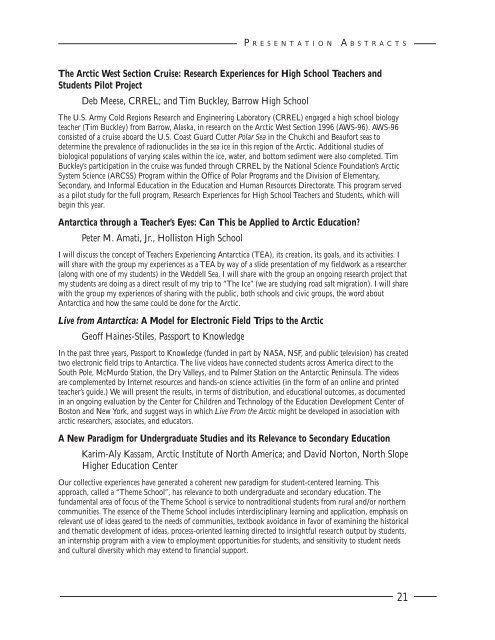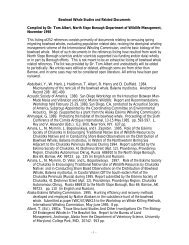ed report 4 page cover - Arctic Research Consortium of the United ...
ed report 4 page cover - Arctic Research Consortium of the United ...
ed report 4 page cover - Arctic Research Consortium of the United ...
Create successful ePaper yourself
Turn your PDF publications into a flip-book with our unique Google optimized e-Paper software.
P R E S E N T A T I O N A B S T R A C T S<br />
The <strong>Arctic</strong> West Section Cruise: <strong>Research</strong> Experiences for High School Teachers and<br />
Students Pilot Project<br />
Deb Meese, CRREL; and Tim Buckley, Barrow High School<br />
The U.S. Army Cold Regions <strong>Research</strong> and Engineering Laboratory (CRREL) engag<strong>ed</strong> a high school biology<br />
teacher (Tim Buckley) from Barrow, Alaska, in research on <strong>the</strong> <strong>Arctic</strong> West Section 1996 (AWS-96). AWS-96<br />
consist<strong>ed</strong> <strong>of</strong> a cruise aboard <strong>the</strong> U.S. Coast Guard Cutter Polar Sea in <strong>the</strong> Chukchi and Beaufort seas to<br />
determine <strong>the</strong> prevalence <strong>of</strong> radionuclides in <strong>the</strong> sea ice in this region <strong>of</strong> <strong>the</strong> <strong>Arctic</strong>. Additional studies <strong>of</strong><br />
biological populations <strong>of</strong> varying scales within <strong>the</strong> ice, water, and bottom s<strong>ed</strong>iment were also complet<strong>ed</strong>. Tim<br />
Buckley’s participation in <strong>the</strong> cruise was fund<strong>ed</strong> through CRREL by <strong>the</strong> National Science Foundation’s <strong>Arctic</strong><br />
System Science (ARCSS) Program within <strong>the</strong> Office <strong>of</strong> Polar Programs and <strong>the</strong> Division <strong>of</strong> Elementary,<br />
Secondary, and Informal Education in <strong>the</strong> Education and Human Resources Directorate. This program serv<strong>ed</strong><br />
as a pilot study for <strong>the</strong> full program, <strong>Research</strong> Experiences for High School Teachers and Students, which will<br />
begin this year.<br />
Antarctica through a Teacher’s Eyes: Can This be Appli<strong>ed</strong> to <strong>Arctic</strong> Education?<br />
Peter M. Amati, Jr., Holliston High School<br />
I will discuss <strong>the</strong> concept <strong>of</strong> Teachers Experiencing Antarctica (TEA), its creation, its goals, and its activities. I<br />
will share with <strong>the</strong> group my experiences as a TEA by way <strong>of</strong> a slide presentation <strong>of</strong> my fieldwork as a researcher<br />
(along with one <strong>of</strong> my students) in <strong>the</strong> W<strong>ed</strong>dell Sea. I will share with <strong>the</strong> group an ongoing research project that<br />
my students are doing as a direct result <strong>of</strong> my trip to “The Ice” (we are studying road salt migration). I will share<br />
with <strong>the</strong> group my experiences <strong>of</strong> sharing with <strong>the</strong> public, both schools and civic groups, <strong>the</strong> word about<br />
Antarctica and how <strong>the</strong> same could be done for <strong>the</strong> <strong>Arctic</strong>.<br />
Live from Antarctica: A Model for Electronic Field Trips to <strong>the</strong> <strong>Arctic</strong><br />
Ge<strong>of</strong>f Haines-Stiles, Passport to Knowl<strong>ed</strong>ge<br />
In <strong>the</strong> past three years, Passport to Knowl<strong>ed</strong>ge (fund<strong>ed</strong> in part by NASA, NSF, and public television) has creat<strong>ed</strong><br />
two electronic field trips to Antarctica. The live videos have connect<strong>ed</strong> students across America direct to <strong>the</strong><br />
South Pole, McMurdo Station, <strong>the</strong> Dry Valleys, and to Palmer Station on <strong>the</strong> Antarctic Peninsula. The videos<br />
are complement<strong>ed</strong> by Internet resources and hands-on science activities (in <strong>the</strong> form <strong>of</strong> an online and print<strong>ed</strong><br />
teacher’s guide.) We will present <strong>the</strong> results, in terms <strong>of</strong> distribution, and <strong>ed</strong>ucational outcomes, as document<strong>ed</strong><br />
in an ongoing evaluation by <strong>the</strong> Center for Children and Technology <strong>of</strong> <strong>the</strong> Education Development Center <strong>of</strong><br />
Boston and New York, and suggest ways in which Live From <strong>the</strong> <strong>Arctic</strong> might be develop<strong>ed</strong> in association with<br />
arctic researchers, associates, and <strong>ed</strong>ucators.<br />
A New Paradigm for Undergraduate Studies and its Relevance to Secondary Education<br />
Karim-Aly Kassam, <strong>Arctic</strong> Institute <strong>of</strong> North America; and David Norton, North Slope<br />
Higher Education Center<br />
Our collective experiences have generat<strong>ed</strong> a coherent new paradigm for student-center<strong>ed</strong> learning. This<br />
approach, call<strong>ed</strong> a “Theme School”, has relevance to both undergraduate and secondary <strong>ed</strong>ucation. The<br />
fundamental area <strong>of</strong> focus <strong>of</strong> <strong>the</strong> Theme School is service to nontraditional students from rural and/or nor<strong>the</strong>rn<br />
communities. The essence <strong>of</strong> <strong>the</strong> Theme School includes interdisciplinary learning and application, emphasis on<br />
relevant use <strong>of</strong> ideas gear<strong>ed</strong> to <strong>the</strong> ne<strong>ed</strong>s <strong>of</strong> communities, textbook avoidance in favor <strong>of</strong> examining <strong>the</strong> historical<br />
and <strong>the</strong>matic development <strong>of</strong> ideas, process-orient<strong>ed</strong> learning direct<strong>ed</strong> to insightful research output by students,<br />
an internship program with a view to employment opportunities for students, and sensitivity to student ne<strong>ed</strong>s<br />
and cultural diversity which may extend to financial support.<br />
21




